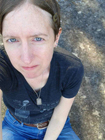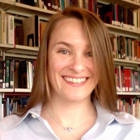WordsThaw Literary Fest Hits Victoria in Two Weeks!
The Malahat Review's biggest literary event of the year is only two weeks away. Over thirty poets, novelists, short-story writers, film makers, and journalists to be featured.
See our website for event details, a list of participants, and to purchase tickets!
Don't forget to sign up for a Brief Encounter to get your writing critiqued by one of six local writers: Stephanie Harrington (nonfiction), Annabel Howard (nonfiction), Keith Jones (graphic novel / cartooning), Troy Sebastian (poetry), Melanie Siebert (poetry), and Katherine Wagner (fiction).
Read on for exclusive interviews with WordsThaw panelists Kim Trainor, Frances Backhouse, and Lisa Goddard.
WordsThaw Interview with Kim Trainor
 Sara Cassidy speaks with Vancouver poet Kim Trainor about her role as panelist for The Investigative Poet on March 19, 1:30 p.m. - 3:30 p.m. Other panelists include poets Arleen Paré and Kyeren Regehr, with moderator Anita Lahey. Tickets available here.
Sara Cassidy speaks with Vancouver poet Kim Trainor about her role as panelist for The Investigative Poet on March 19, 1:30 p.m. - 3:30 p.m. Other panelists include poets Arleen Paré and Kyeren Regehr, with moderator Anita Lahey. Tickets available here.
SC: You write, in reference to Polish poet Krzysztof Kamil Baczynski, that "A poem is a lens to focus sunlight. (Blackened ribs.)" Is it possible for a poem to look too intensely?
KT: I don't think so. That line comes from "The semantic fields of glass and other transparent materials in the poetry of Krzysztof Kamil Baczyński." I was thinking of how poems can be lenses—they can focus attention, through selection, magnification, juxtaposition, reframing. I don't think a poem can look too intensely—but perhaps it comes down to the skill of the poet in rendering what is seen, what Seamus Heaney calls "adequacy." He uses the term in two ways. There is "documentary adequacy," for example, some small but telling detail in a poem, such as an epic simile in Homer where Odysseus' tears are likened to those of a Trojan woman who feels spears prodding her back as she mourns over her husband's body.
Read the rest of Kim's interview on the Malahat website.
WordsThaw Interview with Frances Backhouse
 Annabel Howard talks with Frances Backhouse, author of Once They Were Hats, about her role as panelist for CNF in Canada Today on March 19, 3:45 p.m. - 5:45 p.m. Other panelists include Christopher Gudgeon and Lynne Van Luven, with moderator Alisa Gordaneer. Tickets available here.
Annabel Howard talks with Frances Backhouse, author of Once They Were Hats, about her role as panelist for CNF in Canada Today on March 19, 3:45 p.m. - 5:45 p.m. Other panelists include Christopher Gudgeon and Lynne Van Luven, with moderator Alisa Gordaneer. Tickets available here.
AH: In Once They Were Hats, you embrace a more personal authorial voice. The reader is granted access to your quandaries as to the ethics of fur trapping, for example. Did the more personal style surprise you at all?
FB: I’ve always enjoyed reading other people’s first-person CNF, but never felt a great need to flaunt the first-person pronoun in my own work. At times, I have employed a more personal authorial voice, most notably in my 1999 Chilkoot Trail travel-memoir, Hiking With Ghosts. But I suppose I thought my experiences and opinions were generally less interesting than what I was writing about. As I worked on Once They Were Hats—and with much nudging from Lynne Van Luven and David Leach—I came to understand that to create a compelling narrative thread for this book I needed to take a central role as the curious investigator engaged in a journey of discovery. Having made that decision, I found that the story opened up for me in surprising ways, particularly in the reflective moments like the one you mentioned.
Read the rest of Frances' interview on the Malahat website.
WordsThaw Interview with Lisa Goddard
 Maleea Acker speaks with Associate University Librarian for Digital Scholarship and Strategy Lisa Goddard about her role as panelist for Literary Afterlives on March 19, 10:00 a.m. - 12:00 p.m. Other panelists include Jan Zwicky and Nicholas Bradley, with moderator Heather Dean. Tickets available here.
Maleea Acker speaks with Associate University Librarian for Digital Scholarship and Strategy Lisa Goddard about her role as panelist for Literary Afterlives on March 19, 10:00 a.m. - 12:00 p.m. Other panelists include Jan Zwicky and Nicholas Bradley, with moderator Heather Dean. Tickets available here.
MA: Collaboration between the humanities and other disciplines is increasing, and much of this work seems to be happening in the digital realm, with the advent of areas such as Geohumanities and Digital Humanities. What is the value of digitizing archival material in light of these collaborations?
LG: One obvious benefit is vastly improved access. Many people around the world may be interested in a unique manuscript, journal, or illustration, but only a handful of those people will be willing or able to come to the University of Victoria to view the physical item. Digital surrogates can be easily discovered in web search engines like Google, and are immediately accessible online. This brings archival materials to a huge new audience of people who may never consider going to a physical archive. Digitization has additional advantages to scholars, as it permits a geographically distributed research team to work collaboratively on a collection of objects. Digital surrogates can be marked-up, rearranged, and mashed-up without harm.
Read the rest of Lisa's interview on the Malahat website.